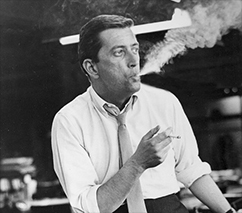
Walt Cody has been an advertising executive, an occasional journalist, and has written, often pseudonymously, for page and screen (feature, network and cable). He lives in Manhattan with a lady and a cat.
Q: Where did you get the idea for Manhattan Roulette?
A: Observation. Observing how the old-time "battle of the sexes" became a cold war--what I mean is a kind of a calculated stalemate with no real winners. Emotionally cold, too. Woman as Tough Cookie. Sex as Phys Ed. A brand new arena where everyone's a user and everyone's a loser.
Q: That's really how you see it?
A: Increasingly, yeah. Good God. People hook up and break up by texting or the new thing, Ghosting. They just disappear.
Q: But that's not true of everyone we meet in this book.
A: Or even in life. No, a few characters are looking for actual genuine connections. These people still exist but they're increasingly outnumbered and increasingly flummoxed.
Q: So, can I gather you're...what? a romantic?
A: Hah! I take that as an accusation but, yeah. I guess. At least I know the difference between love and the gym.
Q: Changing the subject-- about your career--
A: "Career." I never thought of my work as a career. Okay. Go on.
Q: Your bio says you were an ad exec once. What did you do in advertising?
A: Wrote ad campaigns and commercials for big brands. Became a vice president. Quit.
Q: Why?
A: I was in a dull meeting with a client at the company's headquarters --this was in a November--and they were giving out the schedule of what was due when and it ended with another big meeting there in July. I thought: Oh God, I don't want to know where I'll be in July and I sure don't want to know I'll be back in this room. So I quit. And luckily for me, the very next week an outline I'd submitted to a television series got bought and I got assigned to write the script. So I didn't have to face that first week at home thinking "okay, bigshot, what'll you do now?"
Q: What kind of work have you done for the screen?
A: Episodes for documentary and dramatic series. I've "doctored" a few features and had five original screenplays optioned.
Q: Have you ever been anything other than a writer?
A: Sure. I've been a prize-fighter, a brain surgeon and an ornithologist. No. I've been lucky. I've always been able to make a living as a writer.
Q: You've written other novels under other names.
A: Yes. And some of them got good reviews. One of them even in The New York Times.
Q: I guess the next question most people want to know is, How do you write novels?
A: What do you mean by 'how'?
Q: Well, do you get up at 5 AM and write until noon or--
A: Jesus, no. I sleep till noon and do my best work at night. If I'm deeply into something that's really rolling, i'll write day and night. Even if I'm just walking down the street, I'm thinking, writing. If a line comes to me I'll stop on the corner and text it to myself. I inhabit the world I'm writing about.
Q: And the characters? Do you inhabit them too?
A: Absolutely. You have to write characters from inside their heads. Theirs, not yours.
Q: Have you got any tips for would-be authors?
A: That would be pretentious. Besides, I don't know that there ARE any tips. What's the old saying? "There are three basic rules for writing a novel only nobody ever remembers what they are" ? Every novel is different. Has its own internal rhythms and its own unique problems. I can never plot a whole novel in advance. Things spontaneously happen as you write and then generate the next things that can--or can't or must-- happen. Actions and plots have to be logical. Actions have to spring naturally from the characters. Things can't happen because the writer needs them to happen for the sake of his plot but because the different characters need them to happen.
Q: Actually, I suppose, in a way, those are tips. Any other advice?
A: You're pressing me, huh? Okay, I'd say study the writers you admire in the genre you want to write in. Parse and technically analyze what they do. How, technically, do they create suspense? How do they skillfully frame characters? How do they make transitions? How do they use point of view? How do they avoid cloddish Establishment? I think it's possible to learn technique if you know what you're looking for but the rest is maybe...I don't know, genetic. You're either a writer--a storyteller--or you're not. And then there's luck. That's a tip: be lucky. And if not, do the best to create your own luck.























